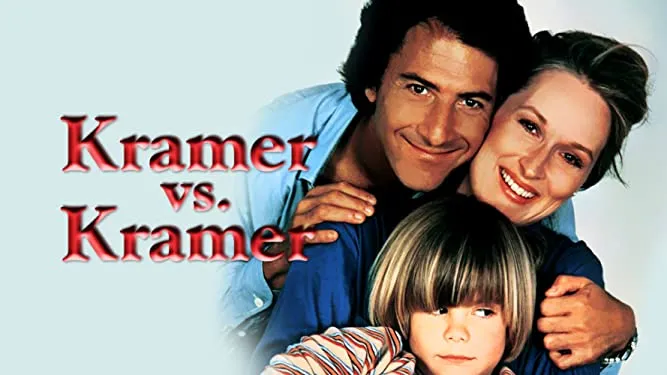
Una película de 1979
Many times, in secondhand bookstores, I came across the Avery Corman book this movie is based on, but never read it. I actually remember seeing Dustin Hoffman on the cover of three different books (Kramer vs. Kramer, Marathon man and The graduate) and yet I didn't read any of them and hadn't seen any of the three movies until last night. I publicly apologize to Mr. Hoffman for that.
Muchas veces, en librerías de segunda mano, me topé con el libro de Avery Corman en el que se basa esta película, pero nunca lo leí. De hecho recuerdo haber visto a Dustin Hoffman en la portada de tres libros diferentes (Kramer vs. Kramer, Marathon man y The graduate) y sin embargo, no leí ninguno y hasta anoche no había visto ninguna de las tres películas. Pido disculpas públicamente al Sr. Hoffman por eso.
However, more than for having seen the book many times, I am in debt since I saw Marriage story. I remember when I was preparing for that edition of the Oscars, I told myself that I would see Scenes from a marriage by Ingmar Bergman, then Kramer vs. Kramer and finally the story of Noah Baumbach, because it is the same thematic line. However, contrary to what was intended, I have done the exact opposite path and I have yet to see Bergman's.
Kramer vs. Kramer is a film directed and written by Robert Benton and starring none other than Dustin Hoffman and Meryl Streep that tells the story of Ted Kramer (Hoffman), an advertising executive who is abandoned by his wife Joanna ( Streep), leaving him alone with Billy, the couple's son, just five years old, whom Ted will have to take care by himself from now on.
Sin embargo, más que por haber visto el libro muchas veces, la deuda la tengo desde que vi Marriage story. Recuerdo que cuando me preparaba para esa edición de los Oscars, me dije que vería Scenes from a marriage de Ingmar Bergman, luego Kramer vs. Kramer y finalmente la historia de Noah Baumbach, por tratarse de una misma línea temática. Sin embargo, contrario a lo pretendido, he hecho el camino exactamente opuesto y aún me falta ver la de Bergman.
Kramer vs. Kramer es una película dirigida y escrita por Robert Benton y protagonizada nada más y nada menos que por Dustin Hoffman y Meryl Streep que cuenta la historia de Ted Kramer (Hoffman), un ejecutivo de publicidad que es abandonado por su esposa Joanna (Streep), dejándolo solo con Billy, el hijo de la pareja, de tan solo cinco años de edad, de quien Ted tendrá que hacerse cargo por sí mismo a partir de ahora.
It wasn't easy for Joanna to make that decision, you can see it in her face when she left. But she needs to find herself. She has always been someone's daughter, someone's wife, someone's mother, her whole life has revolved around roles that she has played around others. She wants to find herself, she needs time and space, she's confused, overwhelmed by years of unhappiness and although she loves her son, she feels that she cannot be with him now.
No fue fácil para Joanna tomar esa decisión, se le ve en el rostro al marcharse. Pero necesita encontrarse a sí misma. Siempre ha sido la hija de alguien, la mujer de alguien, la madre de alguien, toda su vida ha girado alrededor de papeles que ha interpretado alrededor de los demás. Quiere encontrarse, conocerse, necesita tiempo y espacio, está confundida, abrumada por años de infelicidad y aunque ama a su hijo, siente que no puede estar con él ahora.
So Ted takes care of his son, while he deals with his work and discovers how difficult it's to combine the two and how much he was ignorant of not only taking care of Billy but taking care of the house and housework (everything Joanna did). Shortly after the first hour of the movie, when Ted seems to have everything under control and has managed to establish a stronger bond with little Billy, fifteen months after she left, Joanna returns (you wouldn't have thought that they had hired Meryl Streep to act only five minutes, right?) and that's when the real drama begins, because, much more stable and determined, Joanna has returned with one purpose in mind: she wants to take Billy. She has come for the custody of her son.
Así que Ted se hace cargo de su hijo, mientras lidia con su trabajo y descubre lo difícil que es combinar ambas cosas y lo mucho que ignoraba no sólo del cuidado de Billy sino del cuidado de la casa y las tareas domésticas (todo lo hacía Joanna). Poco después de la primera hora de película, cuando ya Ted parece tener todo bajo control y ha logrado establecer un vínculo más fuerte con el pequeño Billy, quince meses después de haberse ido, Joanna regresa (no habrán pensado que habían contratado a Meryl Streep para actuar sólo cinco minutos, ¿verdad?) y es cuando comienza el verdadero drama, porque, mucho más estable y determinada, Joanna ha vuelto con un propósito en mente: quiere llevarse a Billy. Ha venido por la custodia de su hijo.
The situation is complex to analyze. On one hand, we have Ted who has managed to do quite well as a father, he is loving, dedicated, responsible, has no vices, sometimes he loses his patience a bit, but he's not really a bad father and after all, he is the one who has been abandoned by his wife. But Joanna is a woman who was unhappily married for eight years, who raised her son for years while Ted devoted himself to his work almost entirely. She left, yes, she abandoned them, yes, but she needed that distance, that time and that space, to understand that she's capable of raising her son and of achieving things for herself as well. She can't be happy with Ted anymore, but she wants to be with Billy.
La situación resulta compleja de analizar. Por un lado, tenemos a Ted que ha logrado hacerlo bastante bien como padre, es amoroso, dedicado, responsable, no tiene vicios, a veces pierde un poco la paciencia, pero no es en realidad un mal padre y después de todo, es él quien ha sido abandonado por su esposa. Pero Joanna es una mujer que estuvo infelizmente casada durante ocho años, que crió a su hijo durante años mientras Ted se dedicaba a su trabajo casi por completo. Se fue, sí, los abandonó, sí, pero necesitaba esa distancia, ese tiempo y ese espacio, para entender que es capaz de criar a su hijo y de lograr cosas por ella misma también. Ya no puede ser feliz con Ted, pero quiere estar con Billy.
Billy's custody trial is unpleasant for the couple who, despite being in dispute, don't hate each other far from it. The cruelest side of divorce is portrayed in this film in a similar (though perhaps less ruthless) way than it was in Marriage Story. Kramer vs. Kramer won five Oscars: Best Director, Best Picture, Best Adapted Screenplay, Best Leading Actor and Best Supporting Actress and gained respect among its viewers for having brought to the screen a far-reaching issue in today's society (that of then and now) in a simple and very honest way. Knowing that since they both want custody of their child and the judge can only award it to one, who should stay with him? Joanna, for being the mother, for having raised him almost alone, despite having abandoned them? Or Ted, who has become a devoted father and has finally managed to balance his work life and his family life? It's not an easy choice and something leads us to think that the ideal answer to these questions would be precisely a panorama in the middle of these two extremes. But this movie doesn't have an ideal answer. And real life, either.
El juicio por la custodia de Billy es desagradable para la pareja que, a pesar de estar en disputa, no se odian ni mucho menos. El lado más cruel del divorcio es mostrado en esta película de una forma similar (aunque tal vez menos despiadada) que como se hizo en Marriage Story. Kramer vs. Kramer se llevó cinco Oscars: Mejor Director, Mejor Película, Mejor guión adaptado, Mejor Actor Principal y Mejor Actriz Secundaria y ganó respeto entre sus espectadores por haber llevado a la pantalla un tema de mucho alcance en la sociedad actual (la de entonces y la de ahora) de una forma sencilla y muy honesta. Sabiendo que como ambos quieren la custodia de su hijo y el juez sólo se la puede otorgar a uno, ¿quién debería quedarse con él? ¿Joanna, por ser la madre, por haberlo criado casi sola, a pesar de haberlos abandonado? ¿o Ted, que se ha convertido en un padre abnegado y por fin ha logrado balancear su vida laboral y su vida familiar? No se trata de una elección fácil y algo nos lleva a pensar que la respuesta ideal a esas preguntas sería justamente un panorama por allí en medio de esos dos extremos. Pero esta película no tiene una respuesta ideal. Y la vida real, tampoco.










